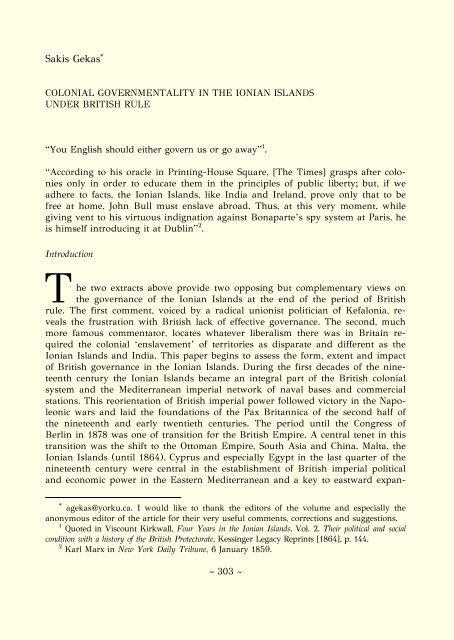Create successful ePaper yourself
Turn your PDF publications into a flip-book with our unique Google optimized e-Paper software.
Sakis Gekas ∗<br />
COLONIAL GOVERNMENTALITY IN THE IONIAN ISLANDS<br />
UNDER BRITISH RULE<br />
“You English should either govern us or go away” 1 .<br />
“According to his oracle in Printing-House Square, [The Times] grasps after colonies<br />
only in order to educate them in the principles of public liberty; but, if we<br />
adhere to facts, the Ionian Islands, like India and Ireland, prove only that to be<br />
free at home, John Bull must enslave abroad. Thus, at this very moment, while<br />
giving vent to his virtuous indignation against Bonaparte’s spy system at Paris, he<br />
is himself introducing it at Dublin” 2 .<br />
Introduction<br />
T<br />
he two extracts above provide two opposing but complementary views on<br />
the governance of the Ionian Islands at the end of the period of British<br />
rule. The first comment, voiced by a radical unionist politician of Kefalonia, reveals<br />
the frustration with British lack of effective governance. The second, much<br />
more famous commentator, locates whatever liberalism there was in Britain required<br />
the colonial ‘enslavement’ of territories as disparate and different as the<br />
Ionian Islands and India. This paper begins to assess the form, extent and impact<br />
of British governance in the Ionian Islands. During the first decades of the nineteenth<br />
century the Ionian Islands became an integral part of the British colonial<br />
system and the Mediterranean imperial network of naval bases and commercial<br />
stations. This reorientation of British imperial power followed victory in the Napoleonic<br />
wars and laid the foundations of the Pax Britannica of the second half of<br />
the nineteenth and early twentieth centuries. The period until the Congress of<br />
Berlin in 1878 was one of transition for the British Empire. A central tenet in this<br />
transition was the shift to the Ottoman Empire, South Asia and China. Malta, the<br />
Ionian Islands (until 1864), Cyprus and especially Egypt in the last quarter of the<br />
nineteenth century were central in the establishment of British imperial political<br />
and economic power in the Eastern Mediterranean and a key to eastward expan-<br />
∗ agekas@yorku.ca. I would like to thank the editors of the volume and especially the<br />
anonymous editor of the article for their very useful comments, corrections and suggestions.<br />
1 Quoted in Viscount Kirkwall, Four Years in the Ionian Islands, Vol. 2. Their political and social<br />
condition with a history of the British Protectorate, Kessinger Legacy Reprints [1864], p. 144.<br />
2 Karl Marx in New York Daily Tribune, 6 January 1859.<br />
~ 303 ~



